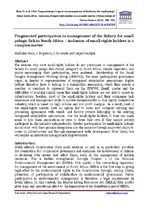| dc.contributor.author | Hara, Mafaniso | |
| dc.contributor.author | Rogerson, J. | |
| dc.contributor.author | de Goede, J. | |
| dc.contributor.author | Raakjaer, Jesper | |
| dc.date.accessioned | 2017-05-29T08:36:15Z | |
| dc.date.available | 2017-05-29T08:36:15Z | |
| dc.date.issued | 2014 | |
| dc.identifier.citation | Hara, M. et al. 2014. Fragmented participation in management of the fishery for small pelagic fish in South Africa – inclusion of small-rights holders is a complex matter. African Journal of Marine Science, 36 (2): 185–196. | en_US |
| dc.identifier.issn | 1814-232X | |
| dc.identifier.uri | http://hdl.handle.net/10566/2887 | |
| dc.identifier.uri | http://dx.doi.org/10.2989/1814232X.2014.930708 | |
| dc.description.abstract | The reasons why most small-rights holders do not participate in management of the fishery for small pelagic fish (‘small pelagics’) in South Africa, despite legislation and policy encouraging their participation, were analysed. Membership of the Small Pelagics Management Working Group (SPMWG), the main participatory governance organ, is limited to representatives of recognised stakeholder associations. Rights holders therefore have to belong to a stakeholder association, which then selects a member or members to represent them on the SPMWG. Small quotas and the difficulties of sourcing capital mean that small-rights holders are not able to invest in infrastructure. Besides, most of the small-rights holders and their companies lack experience and management skills to survive independently in this highly competitive industry, which is based on high volume and low profit margins. As a result, most of the small-rights holders have no option but to enter into complex catching and processing agreements with vessel- and factory owners belonging to the existing recognised stakeholder associations. For the small-rights holders, it does not make sense to join these associations or even to form their own if they cannot actively participate in the industry independently. Greater participation by small-rights holders should start with their genuine integration into the industry through improved ability to invest in infrastructure and through management skills development. Most likely, this will require an interventionist approach by government. | en_US |
| dc.language.iso | en | en_US |
| dc.publisher | NISC (Pty) Ltd (National Inquiry Services Centre) | en_US |
| dc.rights | This is the author-version of the article published online at: http://dx.doi.org/10.2989/1814232X.2014.930708 | |
| dc.subject | Pelagics | en_US |
| dc.subject | Small-scale fisheries | en_US |
| dc.subject | Rights based management | en_US |
| dc.subject | Small-rights | en_US |
| dc.subject | Governance | en_US |
| dc.title | Fragmented participation in management of the fishery for small pelagic fish in South Africa – inclusion of small-rights holders is a complex matter | en_US |
| dc.type | Article | en_US |
| dc.description.accreditation | Department of HE and Training approved list | |

